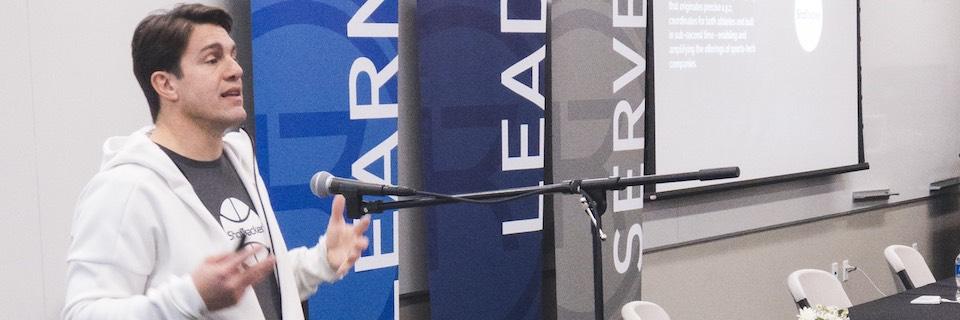Third Annual Summit Puts Big Data Under a Microscope

If one is looking for an example of the impact data can have on organizational decision making, one need look no further back than this week.
On Wednesday, the Houston Astros bested the Los Angeles Dodgers in the 2017 World Series, marking the culmination of a yearslong rebuilding process powered to a large degree by advanced data analytics. The Dodgers, their opponents, are also known around Major League Baseball for an analytical approach that propelled them to a 104-58 record this season.
It was a fitting example for the occasion, said Matthew Barksdale, ’04 EMBA, one of the keynote speakers at Friday’s Executive Business Intelligence and Analytics Summit, the third annual such summit presented on campus by the Helzberg School of Management.
“It used to be the human experience of an individual is what drove decision making, and that’s now becoming data making those decisions,” he said.
The goal and the challenge, Barksdale said, is being able to translate raw data to information, then to knowledge that can be used to make decisions.
Experts gathered at Pedro Arrupe, S.J., Hall to hear from peers about the trends in big data and how they can use those trends and tools for a competitive advantage. Barksdale, the president of Engage Mobile, a Kansas City company that works to make custom digital solutions for their clients, said he talked to a number of leaders in different industries to find out how data is already being leveraged, and what the challenges that remain are. Barksdale said the insights, in industries from car sales to construction, were clear.
“This is coming — you better be ready,” he said.
A panel discussion later in the afternoon included executives from the Federal Reserve Bank of Kansas City, Hallmark Cards and the Cerner Corporation, among others, who are putting data to work in different ways. Bruce Ianni, the CEO and founder of ShotTracker, a company specializing in wearable tech designed to improve athletic performance with analytic feedback and used by some of basketball’s top names, was the closing keynote speaker.
The summit was established in 2015 to give top-level employees a chance to talk about the issues and opportunities of data frankly. It was also inspired by the Helzberg School’s expanding offerings in data science and analytics, the most recent of which — the bachelor of science in analytics and technology — launched officially at the beginning of this academic year.
“One of the reasons we have data science here in the Helzberg School is we take the approach where we’re not just working with data for the tools,” said Cheryl McConnell, Ph.D., the dean of the Helzberg School of Management. “We start with the business question — we figure out what people really need to know, we learn the tools in depth, and we are able to communicate that in a way that facilitates good business decision making in an ethical way.”
University President the Rev. Thomas B. Curran, S.J., said in introducing the day’s events that the value of analytics would surely not be lost on the Jesuits, who sought also to find wisdom in information.
“That is really the bedrock of who we are,” he said.







